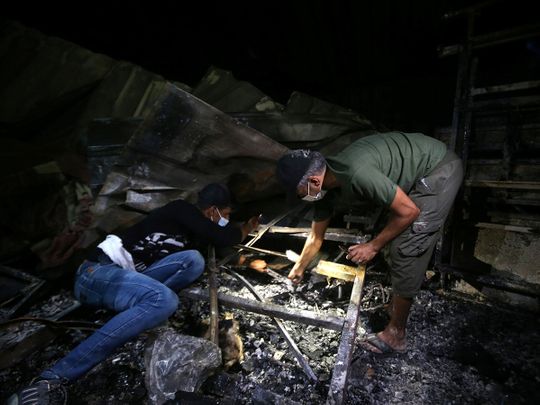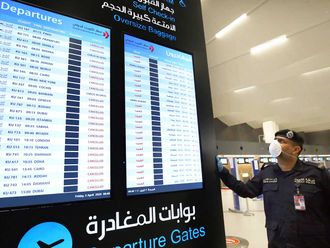
Dubai: A massive blaze sparked by an exploding oxygen cylinder killed at least 52 people, most of them COVID-19 patients, at Al Hussain hospital in Dhi Qar Governorate, Iraq late Monday, local media reported.
The death toll is expected to rise as more patients who suffered severe burns are not expected to recover, with 22 injured.
According to the Dhi Qar Health Directorate, two medical staff and a security man are among the dead.
Some 60 patients were at the 100-bed hospital when the fire broke out. The corridors of the hospital are full of burnt bodies, according to local media.
Dozens of young demonstrators boisterously protested outside the hospital after the deadly blaze.
"The (political) parties have burned us," they shouted in unison.
The lethal blaze also sparked furious calls on social media demanding action and the resignation of top officials.
Local authorities imposed a state of emergency in Dhi Qar governorate, of which Nasiriyah is the capital, and ordered doctors on leave to help treat the injured.
'Failure to protect lives'
Iraqi Prime Minister Mustafa Al Kadhemi held an emergency meeting with ministers and security heads to "find out the causes" of the fire, his office tweeted early Tuesday.
"The catastrophe of Al-Hussein Hospital is clear proof of the failure to protect the lives of Iraqis, and it is time to put an end to this," wrote Mohamed Al Halbousi, Iraq's Parliament Speaker, on Twitter.
Iraq's interior ministry said on Facebook late Monday that the fire tore through temporary structures erected next to the main building, but did not specify the cause.
Sixteen people have been rescued from the blaze, a medical source said late Monday.
Videos shared online showed thick clouds of smoke billowing from the Al Hussein hospital.
In April, a fire at a Baghdad COVID-19 hospital killed 82 and injured 110, sparked by the explosion of badly stored oxygen cylinders.
Many of the victims in the April fire were on respirators and were burned or suffocated in the resulting inferno that spread rapidly through the hospital, where dozens of relatives were visiting patients in the intensive care unit.
The April fire sparked widespread anger, resulting in the suspension and subsequent resignation of then health minister Hassan al-Tamimi.
Iraq - where the oil-reliant economy is still recovering from decades of war and insurgency, and where many people live in poverty - has recorded over 1.4 million COVID cases and more than 17,000 deaths.
Much of the country's health infrastructure is dilapidated and investment in public services is limited by endemic corruption.
Since the virus vaccine rollout began in March, Iraqi health authorities have fully inoculated only around one per cent of the country's roughly 40 million people.
Earlier on Monday, a minor fire broke out at the health ministry's headquarters in Baghdad, but it was quickly contained with no fatalities recorded.











